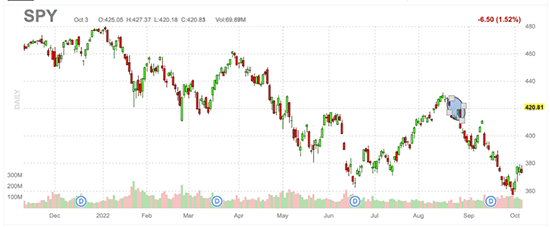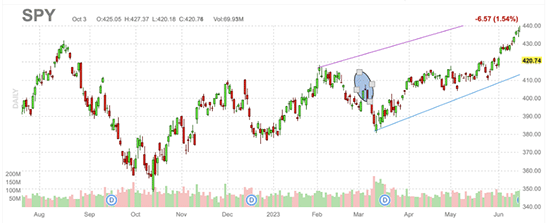
 "I'm thinking about buying a home in Naples," a familiar voice said last month. "We'd probably move there by February."
"I'm thinking about buying a home in Naples," a familiar voice said last month. "We'd probably move there by February."
"Why?" I asked...
"It's a great market. Home prices are holding up," he said. "Everyone's moving there..."
The list went on and on... And of course...
Everyone else is doing it!
If you analyze these sentences, I direct you to the willing buyer's sentiment.
He's considering moving here because home prices are up, and it's a great market.
Okay. Well, what about the future? Can one predict the future?
Can one reasonably say that it's a good idea NOW? Because all the decisions being made are based on various human biases.
The decisions are based on things that already happened.
This is a trap too many investors and speculators fall into.
They read a headline a month after a major development... or big price movement... and get an incredible "Fear of Missing Out."
Or FOMO.
For example, they might be reading about the power of AI... and want to buy NVIDIA (NVDA) well after it's jumped 300% in a year.
Or they've watched oil prices roll from $68 to $92 in less than three months... And now they will buy everything under the sun (even though I've warned them about oil for three weeks.)
They see home prices increase in Southwestern Florida by 60% since the Pandemic. And NOW they want to get into the market?
It doesn't seem to matter how much experience a person has in finance; this FOMO can be a huge killer for your portfolio.
If you want to turn $1 million into half that... follow the strategy of buying late into a price cycle.
But if you're serious about making money...
Follow momentum.
But first...
Choose Your Fighter
If you're not following me on Twitter or X..., you can find me here or @floridarepcap. About 85% of my Tweets are me screaming into the sky with a fist at government statisticians.
If you missed it... a few things happened this week that should infuriate everyone with an American passport.
First, the Bureau of Economic Analysis downgraded THREE YEARS of economic data, proving that Keynesian/Modern Monetary Theory doesn't work as we were told... while revising numbers from BEFORE the pandemic.
Wow... I wonder why that happened.
Second, the government somehow increased the national debt by $275 BILLION in a day this week... with zero explanation.
But there's more to this.
The U.S. government will likely hit $34 trillion in debt by my 43rd birthday in April.
At some point, we'll need to discuss how to approach the reckoning clearly coming at us at full speed.
@MichaelAArouet notes that there are a few options to deal with the massive amount of publicly held debt in the years ahead.

I'll make it VERY simple.
First, cut spending. If we balanced the budget tomorrow, we could cut the Fed Funds rate in December. This isn't hard.
Second, don't cut healthcare and pension entitlements.
Reform them. The easiest thing to do is to employ AI to tackle the more than $100 billion a year in Medicare/Medicaid fraud alone, and then we can start to address the flagrant pricing discrepancies in government-paid healthcare. This isn't hard.
 1 - Haduken!
1 - Haduken!
What will end up happening, though?
If I were running a gambling site, I'd put the odds as follows.
- Spending Cuts: 500,000-1
- Entitlement Reform: 100,000-1
- Drastic Tax Increases: 50-1
- Japanese Fiscal Repression: 1-5.
What is the latter?
Japanese-style fiscal repression is when a government manages debt by keeping interest rates artificially low.
How do they do this? By manipulating the bond market or encouraging domestic institutions like banks (or citizens) to buy government debt.
This approach, used in Japan for years, tries to reduce the real burden of the national debt over time, as low-interest rates mean the government pays less on its borrowings.
Of course, this has consequences.
It will discourage private savings and investments, hindering economic growth for decades.
What did you think was going to happen?
You thought they'd act fiscally responsible?
Hell no. T
His style of economic policy is the equivalent of putting the economy in a vat of acid for two decades.
It Already Happened
If ANY of these scenarios play out, investors must focus on momentum.
But the Fiscal Repression idea will lead to a confusing and spastic stock market - much like we've seen over the last 18 months.
So, back to our focus on momentum.
The S&P 500 is off about 5.5% since September 14.
Instead of getting out of the way, I'm watching people try to call the top on interest rates... and trying to pile into the shorting with aggressive out-of-the-money puts.
But the reality is that the largest part of the damage has already happened.
The price action on the stories we're seeing in the headlines today... started when our momentum readings went negative.
That was three weeks ago. The energy downturn... we projected it three weeks ago based on momentum readings. The rise in interest rates and downturn... projected by a September 14 momentum slump.
This downturn will eventually find its bottom.
We'll bounce off 5% rates and maybe see a squeeze. We're at the point where there's VERY little bid on most equities, raising the prospect of a short-term bump.
Maybe we see some capitulation moment (but that's not close, given that we've only had two 2% days in 2023).
Or central banks fire some new bullets.
But the truth is that the price action has already happened by the time the headlines came.
I know that sounds a bit difficult to visualize...
So, let me give you a few examples of how we got OUT of the way and avoided the peril.
Example 1: Momentum Red on Feb. 21, 2020
On Feb. 21, 2020, our indicator turned red for the first time in months.
At the time, there was great speculation about COVID-19 coming to U.S. shores, but equity markets had rallied over the year's first six weeks.
Money started pouring out during the final week of the month.

What happened next was a 33% decline in the S&P 500 in weeks. Following this indicator, all the FEAR that became headlines during the first two weeks (and the ensuing losses) could have been ignored.
We didn't short.
We were out of the way. By the time most investors started to sell - mid-way through March, the damage was already done. We spent most of our free time irrationally washing off grocery deliveries while wearing gloves on the front steps, like crazy people... or using the money we saved to buy outrageous amounts of emergency pasta. It was a weird time to be alive.
Example 2: Momentum Red on June 8, 2022
On June 8 of that year, momentum turned negative after a dramatic rally in the energy markets.
The equity markets were under stress from the beginning of April due to concerns about rising interest rates. However, on June 8, a sell-off started in the Energy sector. Oil stocks had peaked that week, kicking off a massive selloff similar to what we've witnessed in the sector over the last week.

The S&P 500 ETF (SPY) fell from $419 to $365 in nine trading days.
Our signal told us to get out of the way on the morning of June 8. After another two weeks, we discovered in the Commitment of Traders Report that we'd just experienced the largest sell-off among hedge funds in 15 years.
The headlines told us on June 18 that hedge funds were bearish.
But the move? It already happened. Many people started to short the market at that time... but. The market was oversold that week, and we began to emerge into positive momentum by late July 2023. We bought back into that VERY hated rally over the summer months (when momentum turned green) and did just fine.
Example 3: Momentum Red on Sept. 14, 2022
Last year, we had a few selloffs after the Jackson Hole meeting with Federal Reserve Chairman Jerome Powell. But after a short squeeze hit markets at the start of the month, we saw a quick evaporation of the equity markets.

This negative reading was critical because of the huge downturn in the markets.
We would find out until two weeks later that the British pension system was on the brink of insolvency. That and the Fed would need to change up policy around Mortgage-Backed Securities (Housing stocks increased 100% off that October bottom... and most people missed it because they didn't buy when it went Green).
By the time the headlines created peak fear (the type that typically leads to retail investors dumping stocks)... the move had already happened.
But markets rebounded hard off the 3,500 level... and momentum turned positive within a week of this crash.
Example 4: Momentum Red on March 7, 2023
This year, our readings turned negative during the first week of March.
If you conducted an internet search from Jan. 1 to March 7 for the term "Regional Banks," you'd only find one story that warned about a regional banking crisis.

But nine days later, the story dominated headlines and took the market much lower - before the Fed bailed out the banks.
The result of the selling trend had already happened. In-the-know traders had already taken short-term gains and had moved out of the way.
That's the power of measuring momentum and equity strength sector by sector. The markets returned positive once the Fed provided a bailout (or altered the rules of the discount window). But a lot of people were still trying to fall short.
We didn't make either mistake.
Example 5: Momentum Red on Sept. 15, 2023
Finally, our reading turned negative in mid-August. At the time, we assumed it was due to a change in monetary policy from China.

But this market has sold off due to seasonality... and concerns about rising debt levels and interest rates around the globe.
We were recommending that investors sell... two weeks ago. We even commented that a selloff in energy could take the SPY down to 420 or lower, depending on the reaction to OPEC today.
Now, here's the thing. That's just the selling.
I haven't talked about the rallies and trends that our signals attacked. Think about the big moves this year alone - from January 3 to February 4.
From May 31 to July 13.
If you want to find the trend before the headline... follow and trade Equity Strength Signals with us.
What is Trend Momentum?
It's not that complicated.
It's simply a measure of capital in and out of the equity markets - largely tracked by anomalies at the end of statistical bell curves.
Yes, we give away the reading here at Postcards each day for the larger Index readings, and we'll dig into the individual sectors with our pending launch of Equity Outpost.
Eventually, we'll go even further on this... with goals of software and developing specific recommendations that don't require options. That's right... Momentum WITHOUT options.
I want you to remember something.
It doesn't matter what the news says. It doesn't matter what Barrons writes about this weekend. It doesn't matter what your friends talk about next month in the markets...
Because our signals will tell us... when it's time to act.
And a few weeks later, when everyone else tries to tie headlines to trends... those gains will have already happened.
We'll be ready to sell our winners to the fools lining up to squeeze the last pennies from the action.
Stay positive,
Garrett Baldwin
Secretary of Finance


